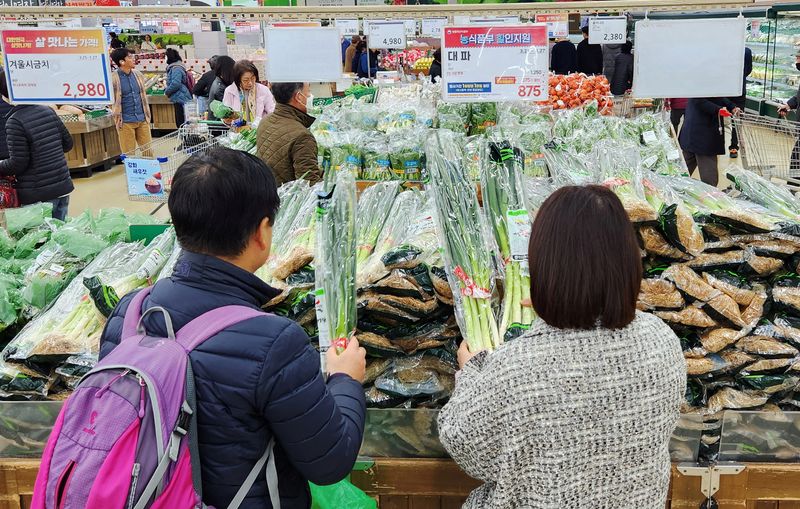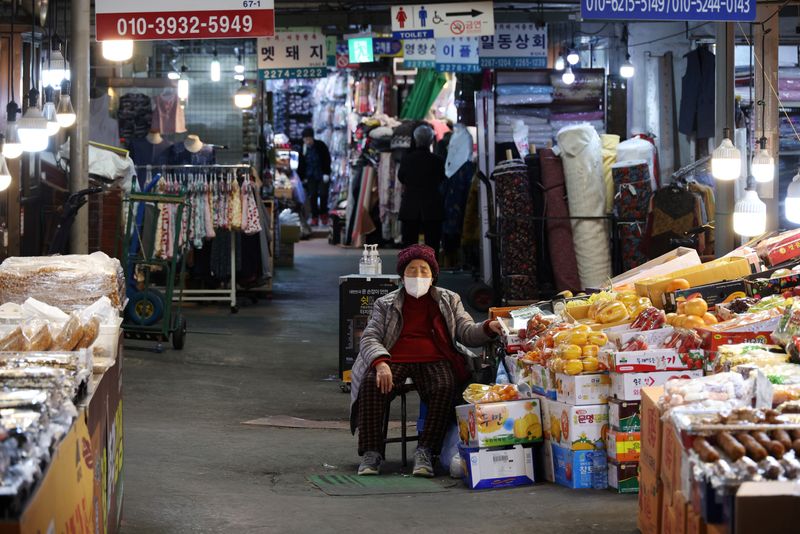By Jihoon Lee and Jihyun Jeon
SEOUL (Reuters) -South Korea's consumer sentiment dropped sharply in March on growing worries about higher produce prices, a central bank survey showed on Tuesday, as inflation hitting the dinner table emerges as a major policy issue at next month's elections.
The consumer sentiment index fell to 100.7 in March from 101.9 in February, posting the biggest monthly drop since October, the Bank of Korea's monthly survey of consumers showed.
Inflation expectations among consumers for the next 12 months rose for the first time in five months, to 3.2% from 3.0%, according to the survey, with two-thirds of the respondents saying produce prices would drive inflation.
That was up from 51.5% in the previous month responding to the same question.
South Korea's consumer inflation accelerated in February, after three months of easing, due to supply-side pressures, mostly from higher agricultural prices.
Experts have attributed higher prices of agricultural products in part to poor weather but the opposition Democratic Party (DP) has targeted President Yoon Suk Yeol's government for mismanaging the economy.
"The economy is collapsing and prices are going through the roof," Democratic Party leader Lee Jae-myung said at a campaign rally in a major produce market on Sunday.
South Koreans will go to the polls to elect the 300-member parliament and Yoon's conservative People Power Party faces an uphill battle to win back a majority now held by the opposition.
Consumer inflation made headlines after Yoon visited a supermarket last week and picked up a bundle of green onions saying "I'd say 875 won ($0.65) is a reasonable price".
Opposition party members and consumer groups criticised Yoon for being out of touch, as a bundle normally sells for more than 4,000 won.
Last week, after Yoon ordered "extraordinary measures" to bring "shopping basket inflation" under control, the government appropriated 150 billion won to fund subsidies and increase supply through direct imports.
It has also announced it would temporarily lower tariffs on imported farm goods.
Farm trade agency data show prices of 13 items including apples, green onions and spinach eased by double-digit percentages since late February after government measures.
Statistics Korea's data shows an index of fresh food items surged 20% in February from a year earlier.
Prices of apples were up 71%, while green onions and strawberries jumped by 50.1% and 23.3%, respectively.
On Tuesday, in the produce section of a large supermarket in Seoul, customers were seen snatching up green onions and zucchinis piled up for sale at below-market prices on government subsidies, but many remained sceptical the relief would last.
"Every time I go grocery shopping, I feel prices rise not just once, but again and again. Now it costs about 70,000 won to 80,000 won to buy what was around 50,000 won before," said Lee Hye-ja, 53, a customer at the Hanaro Mart Yangjae store.
"The government needs to do more to keep inflation stabilised," Lee said.
So Wan-sub, a customer in her late 50s, said the government's pledge to bring down food prices was a "show" ahead of the election and long overdue, as prices have been climbing steeply for months.

"No way 150 billion won is enough to stabilise people's livelihoods. I think the government needs to expand support measures to a much bigger extent," So said.
($1 = 1,337.3800 won)
